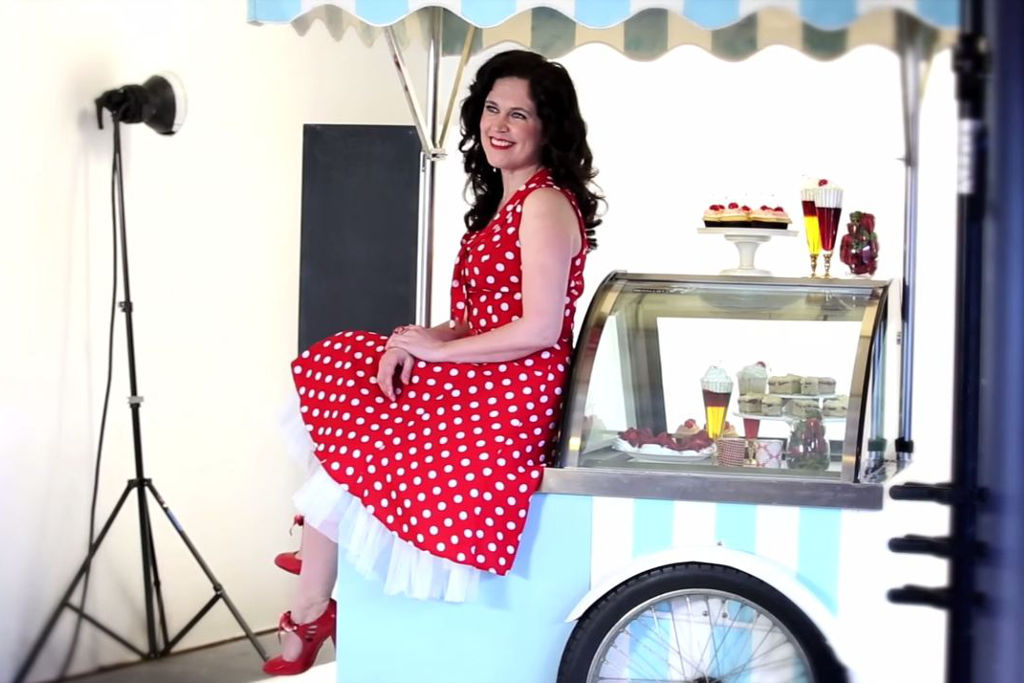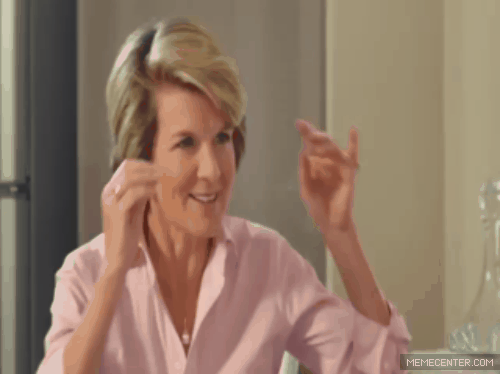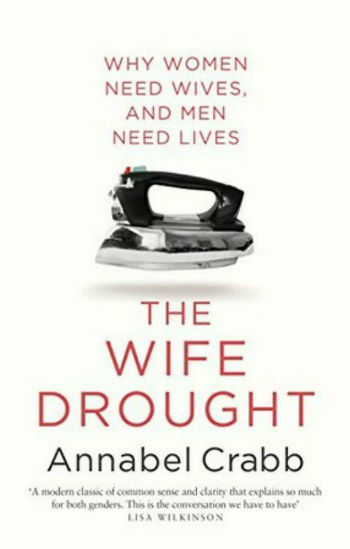Annabel Crabb On Julia Gillard’s Kitchen Skills, Depression In Politics, And Women Who Need Wives
Two weeks after her fourth book was released, on the eve of Kitchen Cabinet's return, we spoke to Annabel Crabb about why she chose to do everything at once.

In April this year, Annabel Crabb was on a panel with Carnival CEO Ann Sherry, as part of Sydney Opera House’s ‘All About Women’ conference. The talk aimed to offer professional women advice about prioritising commitments, without over-loading their lives. It was called ‘How To Say No’.
For a Walkley-winning journalist, a political commentator, an occasional news anchor, a novelist, a wife, and a mother of three — a woman who had her fourth book published two weeks before she wrapped the fourth season of her TV show – Crabb’s advice that day seemed, well, a little rich. “Look, I advocate the rash and liberal saying-of-no in all sorts of circumstances,” she laughs, when I call her bluff. “Unfortunately, saying no to your actual employer can be, you know, really awkward.” Halfway through our interview, Crabb interrupts me to arrange another interview, while in a car, in a tunnel, on her way to a third interview – and she even gets call-waiting right. “Golf claps, please,” she demands on her return.
Released earlier this month, The Wife Drought sets out to fill the gaps left by similar staples of the genre, like Sheryl Sandberg’s Lean In and Hana Rosin’s The End Of Men. Sure, more women are getting jobs, Crabb argues, but how long are they staying in them, and what are they coming home to? In most instances, they are still expected to be the primary carer, and there’s a wife-shaped hole where their support should be – which is not really fair on anybody.
The day before we speak, Crabb is in Cairns, shooting the final episode of Kitchen Cabinet’s new season – an ABC interview series in which she whips up dessert for Australian politicians, in exchange for a homemade dinner in their house. She seems to be doing everything at once. “Yeah. But that’s kind of just the story of my life.”
–
On Christopher Pyne, Amanda Vanstone, and Bob Hawke
In the season four premiere, which airs tonight, Crabb visits the home of former Prime Minister Bob Hawke. Hawke is arguably Labor’s most successful leader, winning four elections to run the country between 1983 and 1991. When he was in college, he famously downed a yard of ale in eleven seconds — but he’s 85 years old now, and needed his son-in-law to help him with the fish.
“Former Prime Ministers aren’t great at being seriously dicked around in their own homes, but Bob was really very patient,” Crabb says. “We really properly home invade when we do this show, too. We go in there and set up, and have a lot of people in their houses for most of the day. I make them talk for six hours or so, and the food goes cold. But he was very tolerant.”
In the hours while they set up fancy lighting and cameras, Hawke would “toddle off to do Sudoku”, or feed his birds. “He sits outside and has a cigar on the table out on the deck, and all these rainbow lorikeets fly down, and he feeds them.” Has Australia’s favourite larrikin leader turned himself into a lovely old grandpa? “Oh no,” Crabb says. “I think he could still get really cross, if he finds the right opportunity.”
And that’s really the best bit about Kitchen Cabinet: it comes at public figures from a completely different angle, to shine a light on who they actually are. “I’ve always found that really helpful as a journalist,” Crabb says.

Julie Bishop demonstrates her infamous death stare.
Sometimes it’s Julia Bishop joking about her terrifying public persona; sometimes it’s a sweary Prime Minister turning out to be a sweet old ornithologist; other times it’s far more confronting — like in episode one of season one, when Christopher Pyne and Amanda Vanstone served up pasta pomodori and tagliata, and turned out to be hilarious buddies that anyone would want to have over for dinner.
“People responded to that one in a furiously amusing way,” Crabb laughs. “What the public doesn’t get to see often, about Christopher Pyne, is how funny he can be. Whether that’s him being misunderstood, I don’t know … Politicians present the front that they want to have seen.” It was the first season, and none of the politicians knew what to expect; it was a trust exercise, and Pyne was nervous. “After it went to air, he got a lot of feedback, in that sort of casually outrageous way that the average Australian voter has. People saying, ‘Oh! You’re not as much of a jerk as I thought you were!’”
“I remember getting this fantastic tweet from a person on twitter who identified themselves as @cavelesbian. She wrote to me saying, ‘I shall never forgive you for making me like Christopher Pyne’. I think that episode was confusing for a lot of people.”
On Politicians and Mental Illness
Crabb’s favourite episode of the upcoming series airs next week: another double-whammy featuring Trade Minister Andrew Robb, and Mary Jo Fisher – a former South Australian liberal Senator famed for performing the ‘Hokey Pokey’ and ‘Timewarp’ in Parliament, who resigned in August 2012 after being charged twice with shoplifting.
“[Fisher] struggles with mental illness and depression, and in the episode she and Andrew – who has also sought treatment for depression – cook me lunch and talk about mental illness and politics,” Crabb says. The episode, she says, almost made her cry. “The things they put up with in politics to try and get ahead, while suffering these at times quite debilitating problems – it really makes you think about the people who struggle with mental illness every day, in every job, not just high profile ones in politics … And oh my gosh, Mary Jo Fisher makes THE most bizarre salad I’ve ever eaten in my life.”
Mental illness in public life has been a fascination of Crabb’s for a while now. Andrew Robb spent 43 years hiding his depression, in fear that the stigma around it would damage his ambition. In 2009 he finally stood down from his post to seek treatment, before publishing a book in 2011 about his experience: Black Dog Daze.
In an interview around that time, Robb said at least 20% of Australian parliament were taking “some sort” of anti-depression medication. “It’s a massive scourge in politics, because all the ingredients are there,” Crabb says. “You’ve got these people who are often A-type personalities; they’re ambitious, restless, they’re full of energy … When you have people who are hugely ambitious who can get thwarted by small things that they don’t control, you’ve got this real capacity for depression. Also they’re living away from their families [in Canberra] for 20 weeks a year, and there’s hardly anyone for them to talk to — because there’s that great fear of being seen to be weak.”
“That’s why someone like Andrew Robb is really interesting,” she continues. “He’s been really upfront about his depression; he took some leave, found a treatment program that worked for him, and is now back in this super demanding job … He sets a great precedent for others, to feel that you can get help and find treatment without throwing it all away.”
–
On Julia Gillard, and Women In The Kitchen
Kevin Rudd seemed sleepy, and didn’t want pavlova. Tanya Plibersek was funny, real, and open. Tony Abbott was robotic, used the fish knife for the butter dish. Joe Hockey couldn’t cook, but was a delightful host.
So many big names have appeared on her show, to various success — but there’s one “get” she never got. “[Gillard] is the only politician we’ve asked to appear on Kitchen Cabinet who consistently refused,” Crabb writes in the Wife Drought. “She can’t cook, and was not keen to pretend she could, or be filmed being rubbish at it. She realised, I imagine, that she would not be extended the indulgence of a dad moment.”
When men are bad in the kitchen – see: Joe Hockey, Christopher Pyne – it’s almost a virtue. “It’s almost – only faintly, but just perceptibly — a recommendation. It’s like, ‘See, this guy’s so busy with important matters of state that he doesn’t know how to fry an egg’. There’s a bit of that going on.” Similarly, the leaderships of Kevin Rudd and Tony Abbott were fleshed out by a series of endearing “dad moments”, from Abbott’s awkward Big Brother appearance to Rudd’s shaving/selfie mishap, yet as soon as Gillard showed one sign of incompetence – The Empty Fruit-bowl Incident Of 2005 – it was a national embarrassment. And not one she was keen to revisit.
“Julia Gillard is my greatest regret,” Crabb says. “That would have been a great show. You asked me before about which politicians were misunderstood? Gillard was just not known by the Australian people during her period as Prime Minister. Maybe that was her fault, maybe it was other people’s fault, I don’t know. I will never understand what happened; why that person – who is a really unusually charming and clever and witty person – often seemed so closed off.
“I wish she’d done the show. I think that the cooking thing really was a big barrier for her. I tried everything: let’s bring picnic baskets to the lodge! I’ll cook, you just need to eat, it’s fine! But I think maybe deep down she had this real concern that a woman in the kitchen not cooking is confronting in some way. And look, I couldn’t say to you 100% that I think she’s wrong on that.”
As Crabb argues in The Wife Drought, no matter how many women join the workforce, our economy still expects them to carry the load of domestic life; to be super-competent super-women, while getting paid less than men whose professional lives remain mostly unchanged after having kids. It would have been refreshing to see a powerful, high-functioning woman shrugging joyfully at her incompetence in the kitchen, but it was too big a risk for Gillard to take.
The most important message in all this, Crabb says, is it is no longer a case of us versus them. “As long as we assume women are the only losers in this situation, nothing will change,” she writes. “Because the truth is that everybody loses in a situation like this.” Sure, men get more pay and more promotions, but they don’t get the worklife flexibility that most of them acknowledge they want. “Why, after all these decades of campaign, reform, research and thought about how we can best get women into the workplace, are we so slow to pick up that the most important next step is how to get men out of it?”
–
Kitchen Cabinet returns to ABC tonight, at 8pm; The Wife Drought is out now through Random House.
